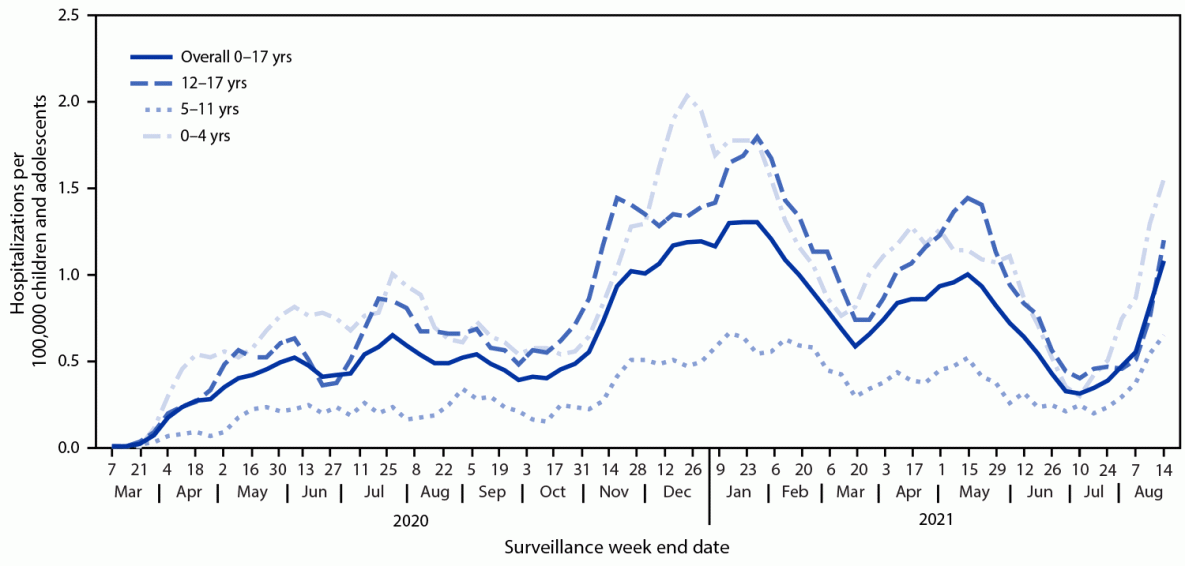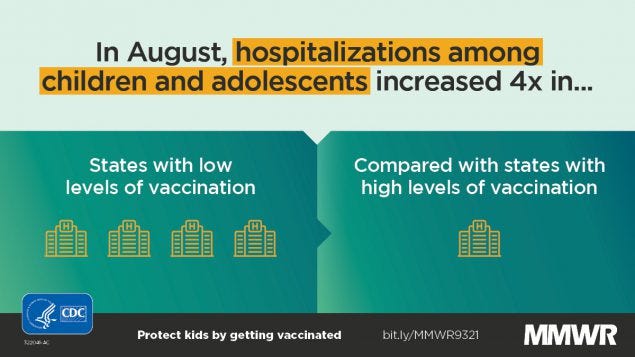Today we got two huge questions answered that we (epidemiologists, clinicians, and parents) have been anxiously waiting for…
What are hospitalization rates across different pediatric age groups? Until now, pediatric hospitalizations have only been reported as <18 years, which is not helpful.
Is Delta more severe for kids compared to previous variants? We know that Delta is more severe for adults. But is it for kids? Could that be explaining the high number of pediatric hospitalizations across the US?
The CDC just published a paper (50 minutes ago, you’re welcome) using data from the Coronavirus Disease 2019–Associated Hospitalization Surveillance Network (COVID-NET). This is a database of COVID-19–associated hospitalizations in 99 counties across 14 states. Scientists looked at pediatric hospitalizations from March 1, 2020–August 14, 2021. What did they find?
The cumulative number of COVID19 hospitalization was 49.7 per 100,000 kids
Rates were highest among children aged 0–4 years (69.2 per 100,000) and adolescents aged 12–17 years (63.7 per 100,000)
Rates were lowest among children aged 5–11 years (24.0 per 100,000)
Among pediatric COVID19 hospitalizations, 26.5% were admitted to an ICU, 6.1% required ventilation, and 0.7% of the children died
The rate of hospitalizations has dramatically increased in the past month
Pediatric hospitalization rates are 5 times higher in August compared to June
The biggest increase was among 0–4 year olds, with a COVID-19 hospitalization rate 10 times higher in August compared to June
The hospitalization rate among unvaccinated adolescents (aged 12–17 years) was 10 times higher than that among fully vaccinated adolescents

But, this isn’t necessarily because Delta is more severe
To assess severity of Delta compared to previous variants, hospitalizations were split up into two time periods: before Delta (March 1, 2020–June 19, 2021) and after Delta (June 20–July 31, 2021).
The rate in which kids died, were admitted to the ICU, needed oxygen, or ventilation was not statistically different during Delta compared to before Delta:
Before Delta: 26.5% were admitted to an ICU, 6.1% required ventilation, and 0.7% died
After Delta: 23.2% were admitted to an ICU, 9.8% required ventilation, and 1.8% died
So, Delta is not likely more severe for kids. Increasing pediatric hospitalization rates are due to high transmission in the community.
Our vaccine wall for kids is largely working in states that have one
The CDC also published a second paper this afternoon, but it’s less surprising. This study looked at hospital records across states to see whether state-level vaccination rates impacted pediatric hospitalizations. In other words, does the vaccine immunity wall help kids? Drum roll…
Emergency department visits and hospital admissions are higher in states with lower population vaccination coverage
Emergency department visits and hospital admissions are lower in states with higher vaccination coverage
Bottom Line: Pediatric hospitalizations have dramatically increased in the past month. Yes, the media is accurately portraying the situation on the ground. And, hospitalizations have increased the most for 0-4 year olds. Importantly, this isn’t because Delta is likely more severe, it’s because we are transmitting Delta in the community and our kids aren’t protected. Your decision not to get a vaccine or implement public health measures in schools or the community is directly impacting the health of kids.
Please do your part this Labor Day weekend.
Love, YLE






What percentage of kids infected with Covid develop Long Covid or other long-term impacts on their health?
This is not entirely related to the above, but we'll consider it adjacent... If the vaccine wall you speak of is not in very good shape and an under 12 unvaccinated kid does catch a mild case of covid (100-100.5 fever, positive rapid test, no other symptoms) after a close contact notification at school, and then the vaccinated parents develop mild symptoms, what does that mean in terms of how we progress after recovery? That is my family's situation after 18 mo. of remote work/school + 8 days of masked school (1st week was mask optional, though, which of course did NOT help anyone, but my kid was wearing a KF94, requested to sit away from others at lunch, and was overall super cautious; 2nd week masks were required of everyone). It is incredibly frustrating to feel like we did everything right this entire time---skipping travel, social events, seeing family, etc. and here we are anyway. At this point, since my son is going to have had delta and then hopefully get vaccinated (pending EUA, of course) within 90 days of infection, and we are already vaccinated but now will have more IgA antibodies, delta-tailored antibodies, etc. AND will hopefully also be getting 3rd booster doses
within 90 days of infection... can we consider ourselves fairly free to do whatever we want until/unless a worse variant pops up? I.e., can eat in a restaurants, make holiday travel plan to see family, etc.? We esp. miss eating out, so while I don't want to be irresponsible, part of me would be SO thrilled for all 3 of us to be able to go out again. (Over the summer when cases were low, my husband and I got to have ONE lunch at Panera, but we didn't take our kid anywhere, of course, and then so soon delta happened and we couldn't anymore...). I guess I am curious how you would approach this and if it does make a difference that this is delta and coupled with vaccination?